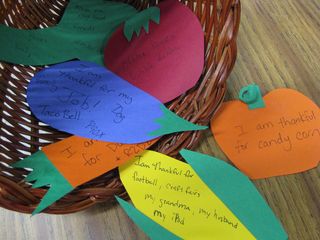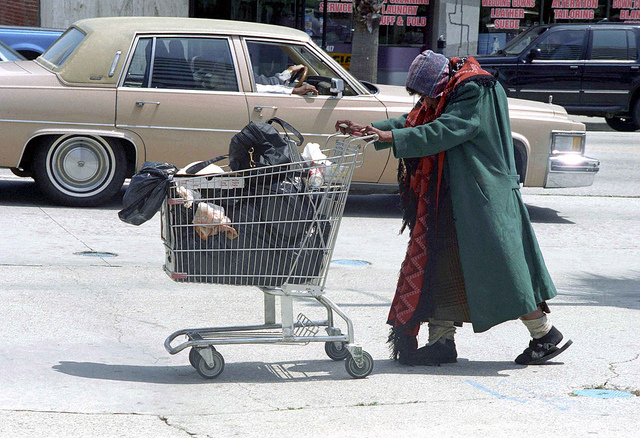 Thanksgiving
Thanksgiving Entries in Thanksgiving (44)
30 Thankful Days (November 3rd)
 Sunday, November 3, 2013 at 05:00AM
Sunday, November 3, 2013 at 05:00AM  Thanksgiving posts always seem to sound like such a scolding: we ought to give thanks.
Thanksgiving posts always seem to sound like such a scolding: we ought to give thanks.
Think about all the things you have and all those other people who have nothing.
There, now: give thanks.
Don’t concentrate on what is missing, be grateful for what you have.
There, now: give thanks.
Ungrateful people are losers.
There, now: give thanks.
Doesn't really help, does it? The problem is, guilt is a terrible motivation for giving thanks. When I read Bible passages instructing me to give thanks, it can sound the same way. On my grumpy days I feel like talking back to the scripture, “Don’t tell me to be happy! Do you think I could put it on from the outside?” (Here’s a happy-coat, why don’t you put it on?) And yet, giving thanks is the will of God. So if it’s the will of God shouldn’t I simply try harder, be obedient, and say thank you? I'll be obediently happy even if I hate it and it kills me! (Good luck with that.)
Frequently we teach children to say please and thank you as a matter of courtesy--as a way of teaching them how to get along in society. It’s the price they must pay to get their milk and cookies. We’re more concerned with the outward performance of good manners than we are with true gratitude.
God is not honored when we tell him what we think he wants to hear--even though we don’t believe it. He knows better. He is honored (and we are healthiest) when our hearts and minds flow naturally with his. In this season we do well to recognize that included in the flow is a heart-condition called thankfulness.
Ask Yourself: What would happen if I were really honest with God? Would he reject me for thinking the wrong thoughts? Would he ignore me? Would he patronize me? Or would he help me change?
Live Into It: Take inventory of your thoughts. The truth is an excellent starting point. Instead of trying to force yourself to change, why not use the truth of how you really feel to begin an honest dialogue with God? Will he leave you trapped and alone in your anger, frustration, or sadness? There's only one way to find out: sit down and talk it out with your Father.
30 Thankful Days (November 2nd)
 Saturday, November 2, 2013 at 06:01AM
Saturday, November 2, 2013 at 06:01AM  We think without thinking about it. Trust me: it’s science. Or more accurately, our thoughts follow well-worn pathways, like the same route we take as we drive to work every morning. Have you ever put your car in park as you get to work and realize, I don’t remember anything from this commute. You did it automatically.
We think without thinking about it. Trust me: it’s science. Or more accurately, our thoughts follow well-worn pathways, like the same route we take as we drive to work every morning. Have you ever put your car in park as you get to work and realize, I don’t remember anything from this commute. You did it automatically.
It’s an amazing fact—if we think the same thoughts often enough, those thoughts become automatic. You can find deep ruts on a dirt road, and you can find them in your brain, too. Try Googling “Develop New Habits.” You’ll find everything from scientific research to pop-psych self-help “seven steps to new thinking.”
Of course, the Creator knew this from the beginning. The seesaw tilts both ways: our actions affect our moods, and our moods affect effect our actions. Check out the conversation where Yahweh pleads to Cain to reconsider his envious, murderous thoughts, or listen to the Apostle remind us that our mind can be renewed.
Ask Yourself: Is it possible that I’ve trained myself to think predictable thoughts? And if I admit that possibility, doesn’t it mean change is also possible?
Live Into It: One simple act can start the transformation. You could take yesterday’s suggestions, or you could take a completely different approach. The key is intentionality. If we combine God’s will (that we should be thankful) with the hope of deep change, the sky itself is not the limit—only the joy of heaven.
30 Thankful Days (November 1st)
 Friday, November 1, 2013 at 09:31AM
Friday, November 1, 2013 at 09:31AM  November 1st (Day One):
November 1st (Day One):
Rejoice always, pray continually, give thanks in all circumstances; for this is God’s will for you in Christ Jesus. ~ 1 Thessalonians 5:16-18
Paul’s words in Thessalonians have something to teach us about the will of God: he wants us to be thankful from the heart. Why torture ourselves over “discovering” God’s will when the first—and most important—step is right in front of us?
Does the Father want outward compliance or a heart capable of expressing his will and doing it naturally? Of course, it’s always better to obey than not to obey, but I think he’s after more than mere obedience—he knows thankfulness is the best thing for us. When our hearts respond with prayers of joy and gratitude to the situations of life, we are responding out of Christlikeness and not simply parroting the company line.
Perhaps the way to fulfill the command “pray continually” is to give thanks in everything. Perhaps we find our way to the path of rejoicing by teaching ourselves the habit of thankfulness—and make no mistake—thankfulness is a habit (but that’s tomorrow’s devotion!).
Ask Yourself: Do I believe it is possible to give thanks in all situations? How could every circumstance contain the seeds of thanksgiving?
Live Into It: Each day, identify three thanks-worthy things. Use the notes App on your phone, or the white board on your refrigerator. Or the back window of your car. It doesn’t matter it you repeat yourself some days—some things are worth giving thanks for every single day.
Give Thanks: Give Your Best ©
 Thursday, September 13, 2012 at 11:24AM
Thursday, September 13, 2012 at 11:24AM  Matilda found a fancy dress in the dumpster and wore it to communion. The dress was torn along the zipper in the back, and had the odor of Chinese carry-out, which must have been somewhere nearby in the dumpster, but it was the only dress Matilda could afford. Out of gratitude to Jesus she wanted to look her best.
Matilda found a fancy dress in the dumpster and wore it to communion. The dress was torn along the zipper in the back, and had the odor of Chinese carry-out, which must have been somewhere nearby in the dumpster, but it was the only dress Matilda could afford. Out of gratitude to Jesus she wanted to look her best.
Everyone in our little church had watched the odd-looking Bag Lady who walked the streets undergo an amazing transformation from societal cast-away to daughter of the Most High. We needed to repent because Matilda was a non-person we saw everyday. Some people had given her the nickname Whispering Jane because she muttered words beneath her breath constantly. When a college kid took the unusual step of buying Matilda lunch at the Elvis Cafe the dominoes began to fall: Matilda became a person again, with a real name, and in just a few weeks of she became a Christian.
The transformation was remarkable. At first Matilda continued to live on the streets and attend our church. That’s when she dressed up for communion. In following months she beat alcoholism and moved into a halfway house near the church. At first we gave her plenty of space at church. Parents steered their kids away. Most adults didn’t try to connect because after all--what do you say to a Bag Lady with dirty clothes and crazy hair? But we watched her become another person: cleaner, saner, safer, approachable, and--well--more like us. And always, when the church celebrated communion Matilda looked for ways to look her best. Her best kept getting better.
“Jesus cleaned me on the inside,” she would say. “It’s the least I can do to spruce up the outside.”
Months turned into years, and the transformation continued. Her change was quiet but constant. Matilda became the kind of person who could hold a job. The halfway house gave way to an apartment of her own, and eventually that same woman who used to push a shopping cart on the city streets bought a used car. She was more like us than ever. Everyone at church knew her now. She was easy to talk to. And always, on communion days, she dressed up. You could count on it: the cleaner she became, the more spectacular her Eucharist dress.
Still, we had to put up with some odd behavior from time to time. I came forward for one communion-day in jeans and a T shirt. “Honestly? That’s the best you’ve got?” was all she said as I returned to my seat from the altar. I wasn’t even sure she said it to me until next week’s church newsletter included a submission from Mattie (everyone started calling her that after she got a stylish haircut and blonde highlights). The newsletter piece ended with:
“If God has washed away your sin then you can do something special for Him on Sunday. Leave the blue-jeans at home and tell Him thanks by looking good. I think everyone has more to give, don’t you?”
Everyone still counted Mattie as our church’s success story, even if it was years ago. If she wanted to exhort us to all do a little better, what’s wrong with that? Look how far she had come. Between the chatty, conversational style of her writing and the fact that no one ever reads or edits the church newsletter, who wouldn’t give her grace to indulge her convictions?
Eventually Mattie organized a communion ministry team. She talked the pastor into serving communion once a month instead of once a quarter. He would still serve the elements, but the ministry team came in early to decorate the place, and practice special music, and distribute a pamphlet Mattie wrote about why communion is the “Passover of the New Testament,” and how we should all take God’s word seriously and observe the traditions handed down from the time of Moses. Mattie’s Communion Ministry Team baked the communion bread according to the standards in Exodus. Everyone in the church got an email the Thursday before Communion Sunday, with suggestions of how we can color-coordinate with the sanctuary decorations, so the entire church can “become an acceptable sacrifice to God.”
Mattie’s gratitude for God’s grace had welled up into an entire ministry of “Give Thanks: Give Your Best.©” She copyrighted the phrase and began speaking at other churches. Eventually she hit the Christian-ministry big time. After guest-spots on two Christian TV networks, Mattie relocated her ministry to Nashville and said good-bye to our church. We all wished her well.
In the months after she left the Communion Ministry Team became less enthusiastic and eventually quit meeting. We still got the Thursday emails because Mattie took the email list with her to Nashville--the graphic design was amazing, and her email list swelled to 50,000.
Our little church went back to serving communion once a quarter, and people went back to blue jeans and T-shirts.
Meditation: Discover a Thousand Treasures
 Monday, July 2, 2012 at 09:53AM
Monday, July 2, 2012 at 09:53AM  Once there was a wealthy man with a strange illness. Each night he forgot his wealth.
Once there was a wealthy man with a strange illness. Each night he forgot his wealth.
He awoke each morning with the fear and uncertainty of a pauper. When his servants arrived with breakfast, he stuffed his mouth quickly, certain the servants would discover they had served breakfast to the wrong man. Sometimes he would grab a crust of bread and run from his own mansion, hiding in the alleyways of the town. His servants would search him out and return him by force to his home, where he was sure he would be punished for his theft.
Other days the wealthy man would encounter his riches one by one, overwhelmed by his good fortune. Still other days he ignored them completely, believing them to be another’s property. And some days he would settle quickly and comfortably into his role of privilege and power. But each day, asleep by nightfall, the wealthy man forgot his riches by midnight only to awake the next morning unaware.
One night an angel appeared to him in a dream and offered to heal him completely. “I can speak the word,” said the angel, “and you will remember your wealth forever.”
“No,” said the wealthy man. “My best days are when I discover afresh who I am. True--it’s a terrible day when I live in fear and cannot accept the blessings, but the worst days are when I ignore them completely, either because of ignorance or privilege.”
Then he made the angel a counter-offer: “Grant that I will encounter my riches one by one, and that I will learn to stop in each moment and offer thanks afresh. I want each day to be a celebration of my good fortune.”
So the angel spoke the word, and gave him the healing he asked for. Over the years a strange thing happened to the rich man. Slowly, yet surely as the sun would rise, instead of forgetting is wealth each night, he began to remember his blessings from one day to the next, but retained the wonder and amazement of a man who encountered them for the first time. In fact, he discovered he was more than merely a person of wealth. He was, in fact, a son of a king. Day by day he saw the benefits and blessings of his father’s opulent, over-flowing love, and shared them with the certainty that the flow would never end. Whatever treasures were daily lavished at his feet, he both partook with thanks and distributed to others at will.
When he died he left an epitaph, engraved for all to see: “Each day has a thousand treasures--most of which I will forget by midnight. But I can thank him in the moment, and the moment can become a lifetime.”

